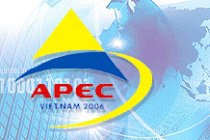2006年VOA标准英语-APEC Summit Seeks to Break Global Trade Impasse(在线收听)
By Luis Ramirez
Beijing
08 November 2006
Leaders of 21 economies making up the Asia-Pacific Economic Cooperation group will meet in Hanoi, Vietnam, later this month to talk about liberalizing trade in the region. Organizers also hope to move along global trade negotiations, which are at an impasse due to a dispute between rich and poor countries - largely over farm subsidies. VOA correspondent Luis Ramirez, who will be covering the summit, reports the possible North Korean nuclear threat will also be high on the agenda.
----
North Korea's first-ever test of nuclear device on October 9 has raised alarm on both sides of the Pacific Ocean - and worry about what economic disruptions could ensue if there were a show down on the North Korean nuclear issue.
Trade among APEC members accounts for about half of all global trade and almost 60 percent of the world's Gross Domestic Product.
 |
||
Kui-Wai Li, the director of the APEC Study Center at the City University of Hong Kong, says the summit will give these leaders a chance to confer but no definitive agreements on the matter are likely.
"It's most likely that the members will talk about the North Korean case and also bring the issue to other APEC members just to alert the other members [of] the importance of a nuclear…the threat of war," he said. "They'll use it more as a promotion rather than a decision-making platform."
Summit organizers say they will try to keep matters focused on economic issues - APEC's main concern.
However, APEC Executive Director Tran Trong Toan tells VOA the floor will open to discussion of any subject that is on the minds of APEC leaders.
"APEC is a premier forum for economic cooperation," he said. "Hence, the economic agenda is expected to be the prime focus of our leaders' discussions. [On] the other hand, as APEC leaders meet, they can also talk about issues of common concern, which have an impact on the APEC goals of economic development and community-building, such as human security."
Global trade liberalization is a top item. World Trade Organization negotiations are at a standstill over a dispute on farm subsidies that pits the United States and European Union against major developing nations. The poorer countries accuse the richer ones of being slow to do away with tariffs that they say are designed to protect farmers in wealthy countries.
Analysts see the meeting in Hanoi as an opportunity to help break the stalemate.
WTO spokesman, Keith Rockwell, says the Hanoi meeting will be another chance for leaders to put their heads together and keep the momentum going.
"It's a regional forum and many of the key players are from other regions," he said. "So, it's limited in terms of the coverage of membership. Nonetheless, the players who will be in Vietnam are extremely important to our system. What can be done there is that there could be discussions through which participants in the negotiations can explore ways that might be the basis for compromise."
Alan Oxley is chairman of the Australian APEC Center at Monash University in Australia. He says APEC has a huge interest in the WTO's plan to lower global trade barriers and open up commerce between rich and poor nations.
"The APEC countries have always expressed concern about the slowdown of liberalization and in particular, in the WTO," he said. "I think we're also going to see the consolidation of a trend to widen the focus of growth from improving free trade to the development of free markets.
Analysts say APEC nations recognize that freer trade must be accompanied by efforts to lift poor nations - and their millions of potential new customers - out of poverty.
So this year's summit will produce a so-called Hanoi Action Plan, in which the 21 members will restate their commitment to free and open trade and investment that benefit rich and developing countries.
APEC's 21 member economies are Australia, Brunei, Canada, Chile, China, Hong Kong, Indonesia, Japan, Malaysia, Mexico, New Zealand, Papua New Guinea, Peru, South Korea, the Philippines, Russia, Singapore, Taiwan, Thailand, the United States, and Vietnam.
The Hanoi meeting begins on November 12. Aside from talking about reducing global imbalances, delegates will discuss how to facilitate electronic business, tax reform, and setting up mechanisms to resolve trade disputes among APEC members. Promoting cultural exchanges and tourism are also on the agenda.
One other matter of security on the table will be how to combat terrorist financing, money laundering, and other abuses of financial systems in the region. Some officials attending an APEC finance ministers' meeting in Hanoi in September called for a discussion on a commitment to not allow financial institutions to be used to funds the proliferation of weapons of mass destruction.
The summit of leaders of the 21 economies will take place on November 18-19.
President George Bush is scheduled to meet one-on-one with several leaders attending, before paying visits to Singapore and Indonesia.